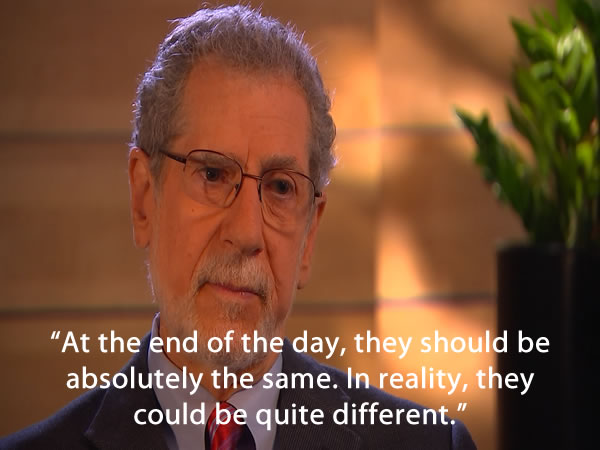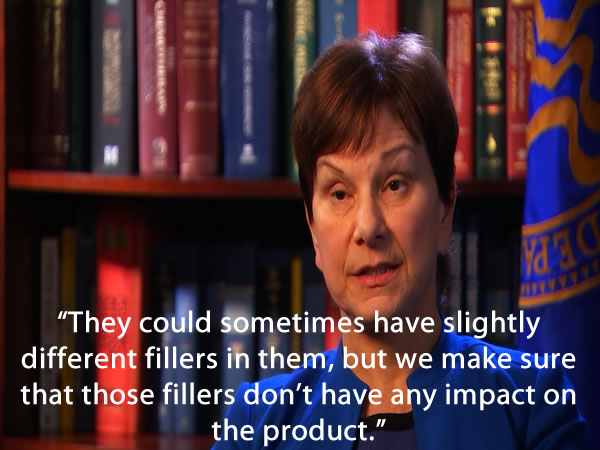I-Team: Generic drugs: Are they the same as brand name?

RALEIGH (WTVD) -- Eighty percent of all prescriptions written today are filled with the generic version of a brand name drug. The generics are supposed to be the same as the brand name medicine, but the I-Team discovered that's not always the case.
Connie Lowenstein said she was taking the anti-depressant, Wellbutrin XL, the extended release formula of the drug.
"I took it once a day for several years and then my insurance company insisted that because generics were available and much less expensive that they wanted me to try the generic, which I did," said Lowenstein.
But she started having side effects from the generic known as Budeprion.
"I was having anxiety or anxiousness earlier on in the day and it was keeping me up at night, causing heart palpitations," said Lowenstein.

The I-Team learned that Lowenstein is one of hundreds of people who contacted Joe Graedon, the co-host of the radio show, "The People's Pharmacy", on WUNC radio.
Graedon said callers complained that the generic Wellbutrin caused side effects they never experienced with the brand name drug. They told him: "I've become irritable. I have headaches. I've had digestive tract problems. My hand shakes. I've got a tremor, and I can't sleep very well. What's going on?," said Graedon.
Graedon asked the FDA why it was happening.
"The FDA said, 'Oh don't worry it's all psychosomatic. When people see it's a different kind of pill, it's just in their head,'" said Graedon.
But it was not just in their head.
The I-Team learned it was a problem with the bioequivalence of the generic which is how quickly the drug released its active ingredients in the body.
Dr. Todd Cooperman of 'ConsumerLab.com' tested the 300 milligram dose of the generic.
"What we found was shocking," said Cooperman. "The generic released its active ingredient very quickly so you're getting a burst of medication coming out very early on with the generic that you shouldn't be getting."
The FDA said their studies show the generic drug as 'bioequivalent' to its brand name version. In other words, the extended release pill dissolves in the body the same. But it doesn't.
The I-Team traveled to FDA headquarters in Maryland to find out why.
Janet Woodcock, director of Drug Evaluation and Research for the FDA, said the agency made a mistake.
She said the drug company tested lower doses of Budeprion XL but did not test the 300 mg dose because it was afraid volunteers might have seizures.
"We had companies do the tests on the lower doses, and they were found to be bioequivalent but we made an assumption that it would also be bioequivalent at the higher dose and that assumption actually turned out to be incorrect," said Woodcock.
As a result, Impax, the company that made Budeprion 300 XL, took the drug off the market.
"What we learned from the Budeprion case was in the case of extended release products, we can't do this kind of extrapolation, and we will have to find ways to test them for bioequivalence," said Woodcock.
The FDA is now taking a hard look at how it tests all extended-release drugs.
The I-Team investigated what other generics people complained about to the FDA and discovered other reports about the extended release generic drug for Concerta called Methylphenidate Hydrochloride. The drug is used to treat people with ADHD.
The FDA is concerned about the bioequivalence of two generic versions of Concerta made by Mallinckrodt and KUDCo.
Patients said the generic may release ingredients more slowly than the brand name. The FDA wants both companies to prove their drugs meet the bioequivalence standards-or take them off the market.
But the I-Team wanted to know whether generic drugs are the same as the brand name drugs.
"They must contain the same active ingredient at the same strength and that has to be absorbed into the body at the same rate and extent as the brand name," said Woodcock.
But the inactive ingredients or fillers are usually not the same.

"They could sometimes have slightly different fillers in them but we make sure that those fillers don't have any impact on the product," said Woodcock. "So for medical intents and purposes, they are the same."
Joe Graedon, the radio pharmacologist, said if you're taking extended release generic drugs, you might not be getting what you think you are.
"The FDA has a different definition for the word 'identical,'" said Graedon. "As long as at the end of the day the same amount is absorbed, that's ok. That's bioequivalent. But there can be a huge difference at half-hour, one hour, two hours and three hours."
At the end of day, they should be absolutely the same. In reality, they could be quite different."
Only one pharmaceutical company, Mallinckrodt, the maker of generic Concerta, got back to the I-Team with a comment. It said: "Mallinckrodt strongly believes its methylphenidate ER products are safe and effective when used in accordance with the approved labels."
Click here for the entire statement (.pdf)
Both Impax, the maker of generic Wellbutrin XL, and Kudco, the maker of generic Concerta, had no comment about this story.
More information
Facts about Generic Drugs:
Where to report a problem with a drug:
http://www.fda.gov/safety/medwatch/default.htm
FDA Answers about Concerta:
http://www.fda.gov/Drugs/DrugSafety/ucm422569.htm
FDA Drug Testing
http://www.fda.gov/Drugs/ScienceResearch/ucm407277.htm
FDA Update on Generic Wellbutrin:
Consumer Lab.com report on Wellbutrin vs Generic report:
https://www.consumerlab.com/reviews/Wellbutrin_vs_Generic_Bupropion/Wellbutrin/



